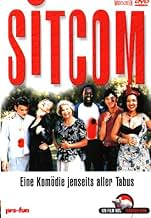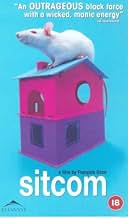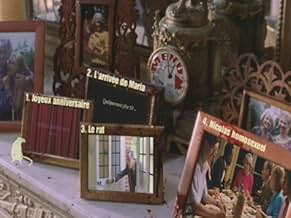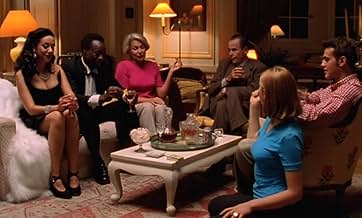IMDb-BEWERTUNG
6,6/10
5765
IHRE BEWERTUNG
Füge eine Handlung in deiner Sprache hinzuThe adventures of an upper-class suburban family dealing with their younger brother's homosexuality, elder sister's suicide attempt, masochist tendencies, and a free-spirited maid and her hu... Alles lesenThe adventures of an upper-class suburban family dealing with their younger brother's homosexuality, elder sister's suicide attempt, masochist tendencies, and a free-spirited maid and her husband.The adventures of an upper-class suburban family dealing with their younger brother's homosexuality, elder sister's suicide attempt, masochist tendencies, and a free-spirited maid and her husband.
- Auszeichnungen
- 3 Gewinne & 3 Nominierungen insgesamt
Empfohlene Bewertungen
François Ozon's pitch black mickey take is a biting satire on family life and a brash distraction from the shows of it's title. While many sitcom's are monotonous affairs, Ozon's take on the medium is anything but. Despite taking in many of the clichés of the sitcom - stuffy mother, raunchy maid, bored father etc - Sitcom manages to be continually inventive and the way that it exposes the clichés of the genre is both ludicrously ridiculous and harshly disturbing. The French director proves with this movie that he's not afraid to overstep several boundaries and make a film that dares to be different, and for that reason this film will never be universally liked. However, if you can connect with Ozon's vision, you're in for a treat and that was the situation I found myself in! The story follows a father who, after bringing his family a lab-rat for a present, finds his family collapsing around him - his son discovers he's gay, his daughter jumps out of the window and his wife...well, I'll leave you to find that out on your own.
Sitcom is a singularly unpleasant experience. Watching family life deteriorate is a much more gruelling affair than you might imagine, and even though the family and the situation that Ozon has presented are utterly ridiculous; he still manages to inject life into it, which ensures that it hammers home the point that the auteur intended. Whenever I see a film that dares to be different and deliver something that I haven't seen before, I tend to find myself heaping the praise on it and that is certainly the case with this film. You will not find a comedy with a more rotten core than this one and similarly you will not find one that dares to present the utterly ridiculous happenings that this movie thrives on. I don't know how Ozon thought he could get away with some of the things in this film - not just the taboo's he's portrayed, but other things too, some of which are just too stupid to comprehend but Ozon makes them work! Sitcom is a movie that needs to be experienced, and it's a film that will divide opinions as much as any other movie ever made. And if only for that reason - see this film as soon as possible.
Sitcom is a singularly unpleasant experience. Watching family life deteriorate is a much more gruelling affair than you might imagine, and even though the family and the situation that Ozon has presented are utterly ridiculous; he still manages to inject life into it, which ensures that it hammers home the point that the auteur intended. Whenever I see a film that dares to be different and deliver something that I haven't seen before, I tend to find myself heaping the praise on it and that is certainly the case with this film. You will not find a comedy with a more rotten core than this one and similarly you will not find one that dares to present the utterly ridiculous happenings that this movie thrives on. I don't know how Ozon thought he could get away with some of the things in this film - not just the taboo's he's portrayed, but other things too, some of which are just too stupid to comprehend but Ozon makes them work! Sitcom is a movie that needs to be experienced, and it's a film that will divide opinions as much as any other movie ever made. And if only for that reason - see this film as soon as possible.
I just saw this French movie on my local ethnic station & loved it! Although this movie isn't for the usual consumer of comedy, it spirals around many weird & taboo issues such as: Incest, Homosexuality, Depravity & Sadomasochism. Around all this is "the mother" who is naively caught up in her everyday routines to find the secrets her friends & family hold. I recommend this movie for 2 reasons: It's French & it's different.
This is an odd film about a father who brings a pet rat home to his family, which then sparks off their innermost sexual desires. The son announces he's gay, and ends up with a maid's boyfriend; the daughter jumps out of the window and is paralysed, and then gets her boyfriend to hurt her while she puts cigarettes out on her arm. The wife starts to sleep with the gay son. The daughter asks her father to have sex with her, but he declines, saying she's ugly. The ending is really surreal. Wacky, satirical, perverse & crazy. See it if you can.
"Sitcom," above all, requires a large grain of salt: it is visually shocking and provocative, and American audiences in particular often dismiss it as a "vulgar" film on these grounds. The plot, however, contains an allegorical richness that is rarely attained in most modern films. It is a theater of the absurd, and must be understood as such in order to comprehend the complexity of meanings and social commentaries it has to offer.
For starters, it is a criticism on the most basic level of the social alienated embodied by bourgeois social standards in France. One of the most accessible aspects of this commentary is the unwillingness of the characters to genuinely communicate to one another. While this makes several scenes totally hilarious, at the same time it micro-cosmically calls into question the validity of a "coherent" unit to address its internal problems; this is, obviously, an allegorical reference to France as a nation. The nation--like this bizarrely self-contained familial unit--is unable to progress and modernize in accordance with modern needs because of a lack of communication. The abstract issues of race, homosexuality, insanity, and even modern psychiatry are called into question. The modern cannot be a museumization of the past, despite whatever aesthetic benefits such staticness might offer.
It would be a good idea before viewing this film to read Freud's "Totem and Taboo." Despite the fact that no scholarly connections between the film and this work in particular have been made, it provides at least some provocative insight into the plot. I would also suggest against making a viewing of this film a family event; it would be most appropriate among those of an older age group, and is a particularly provocative piece of French film.
For starters, it is a criticism on the most basic level of the social alienated embodied by bourgeois social standards in France. One of the most accessible aspects of this commentary is the unwillingness of the characters to genuinely communicate to one another. While this makes several scenes totally hilarious, at the same time it micro-cosmically calls into question the validity of a "coherent" unit to address its internal problems; this is, obviously, an allegorical reference to France as a nation. The nation--like this bizarrely self-contained familial unit--is unable to progress and modernize in accordance with modern needs because of a lack of communication. The abstract issues of race, homosexuality, insanity, and even modern psychiatry are called into question. The modern cannot be a museumization of the past, despite whatever aesthetic benefits such staticness might offer.
It would be a good idea before viewing this film to read Freud's "Totem and Taboo." Despite the fact that no scholarly connections between the film and this work in particular have been made, it provides at least some provocative insight into the plot. I would also suggest against making a viewing of this film a family event; it would be most appropriate among those of an older age group, and is a particularly provocative piece of French film.
I love Francois Ozon's films. Together with this, I have seen all his feature-length work (Sitcom, Criminal Lovers, Drops Falling On Burning Rocks, Under the Sand, 8 Women, Swimming Pool). "Sitcom" is the film by him that I found the most bizarre and unsettling (even though I had some good laughs). The ending was a bit too much, but otherwise, I quite liked it. The atmosphere and the bizarre events sometimes reminded me of "Criminal Lovers", that he made immediately afterwards, but with more focus on black humor than in the latter.
The whole way through, the story of "Sitcom" reminded me of Pier Paolo Pasolini's "Theorem" (Teorema) - much more than of Bunuel's "The Discreet Charm of the Bourgeoisie", already mentioned here. In Pasolini's 1968 film, a strange visitor unsettles the life of an Italian bourgeois family: after he leaves, the daughter loses her mind, starts lying catatonicly on her bed and has to be transferred to a mental institution; the mother, in a desperate urge for promiscuity, picks up handsome young men on the streets for sex; the maid goes back to her village and becomes a levitating saint; the son discovers his talent for painting (and probably realizes that he is gay); the father at first seems not to be affected, but then he also succumbs to the influence.
Ozon's film seems to take up this motif and transfer it to a very-very black farce and a parody of American sitcoms (I love the set design with all those bright colors!). People here (especially the mother) always try to "talk things out" like in the sitcoms, but it doesn't really work, because the environment is/has become so different.
At the very end, though, everyone seems to have found themselves at last: from a dysfunctional family, they have apparently become a happy family again - though not exactly in the traditional, conservative way. But the white rat is still lurking everywhere...
The whole way through, the story of "Sitcom" reminded me of Pier Paolo Pasolini's "Theorem" (Teorema) - much more than of Bunuel's "The Discreet Charm of the Bourgeoisie", already mentioned here. In Pasolini's 1968 film, a strange visitor unsettles the life of an Italian bourgeois family: after he leaves, the daughter loses her mind, starts lying catatonicly on her bed and has to be transferred to a mental institution; the mother, in a desperate urge for promiscuity, picks up handsome young men on the streets for sex; the maid goes back to her village and becomes a levitating saint; the son discovers his talent for painting (and probably realizes that he is gay); the father at first seems not to be affected, but then he also succumbs to the influence.
Ozon's film seems to take up this motif and transfer it to a very-very black farce and a parody of American sitcoms (I love the set design with all those bright colors!). People here (especially the mother) always try to "talk things out" like in the sitcoms, but it doesn't really work, because the environment is/has become so different.
At the very end, though, everyone seems to have found themselves at last: from a dysfunctional family, they have apparently become a happy family again - though not exactly in the traditional, conservative way. But the white rat is still lurking everywhere...
Wusstest du schon
- WissenswertesFrançois Ozon admitted in interviews that his dream cast for the film would have been for Lana Turner to play the daughter and Bette Davis her mother.
- VerbindungenReferenced in 8 Frauen (2002)
- SoundtracksSymphoniie no 1 (Feirlich II)
Music by Gustav Mahler (as G. Mahler)
Top-Auswahl
Melde dich zum Bewerten an und greife auf die Watchlist für personalisierte Empfehlungen zu.
- How long is Sitcom?Powered by Alexa
Details
Zu dieser Seite beitragen
Bearbeitung vorschlagen oder fehlenden Inhalt hinzufügen























